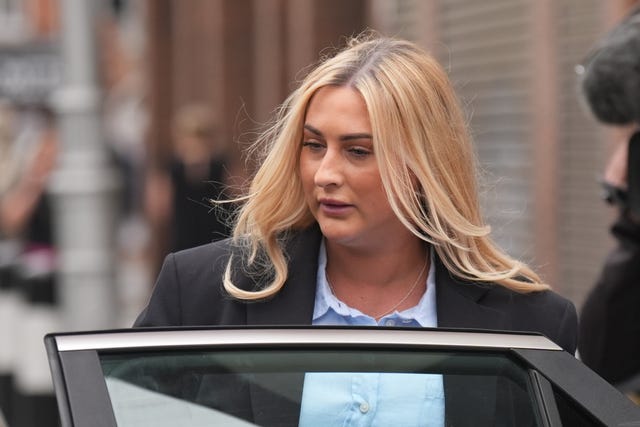Nikita Hand's lawyer asks court to refer McGregor appeal affidavits to DPP
The Irish Director of Public Prosecutions (DPP) should examine affidavits making accusations against a woman who sued Conor McGregor, her lawyers have said, after the fighter decided to withdraw them from his appeal.
Former hairdresser Nikita Hand, 35, successfully sued McGregor in a civil court over an incident in which he was alleged to have “brutally raped and battered” her in a penthouse at a south Dublin hotel in December 2018.
During a three-week case at the High Court in Dublin last November, McGregor told the court he had consensual sex with Ms Hand.

After six hours and 10 minutes of deliberating, the jury of eight women and four men found McGregor civilly liable for assault.
Ms Hand, also known as Nikita Ni Laimhin, was awarded 248,603.60 euros (about £206,000) in damages.
Her lawyers have said she was disadvantaged by “highly disparaging and unfair criticisms” in “widely published” claims McGregor brought as part of his appeal that she did not have a chance to reply to in court before they were withdrawn.
It related to affidavits from two former neighbours of Ms Hand which said she had been assaulted by her then-partner at around the same time of the incident at the hotel.
On Tuesday, McGregor’s legal team dramatically withdrew that ground of appeal which would have introduced the new evidence into the proceedings – saying it would no longer be relying on the material.
John Gordon SC, for Ms Hand, said it was “frankly not appropriate” for the ground to be withdrawn at a late basis.
He said his client, who had denied accusations within the affidavits, had been “put through the wringer yet again”.
On Wednesday, Mr Gordon raised the matters again and asked the Court of Appeal to use its jurisdiction to refer matters to the DPP.
He said the application on the affidavits had been made “some months ago” and the material the proposed witnesses were due to raise had been “published widely”.
He said the court was aware of the “scale of the accusations” made against his client, which he said were a series of “highly disparaging and unfair criticisms” including that she had been lying.
Mr Gordon said the application to introduce the witnesses was not just to produce further evidence, but also to “undermine my client’s reputation”.
He said Ms Hand had described what was alleged as lies in her responding affidavit and that she should have been entitled for her opportunity to “call this out in court”.
He said his client had been disadvantaged by the application.
Mr Gordon also said it amounted to discontinuation of part of the appeal and asked the court to add terms of the payment of costs to Ms Hand’s side.
Mark Mulholland KC, for McGregor, said that withdrawing the application did not amount to a discontinuation of proceedings and if Mr Gordon believed that a criminal investigation was necessary, it should be dealt with in that forum rather than the court.
Speaking before Mr Gordon dealt substantively with the issue on Wednesday, Mr Mulholland said it was an attempt to get the matter on the record for the media, adding that this would be “wholly inappropriate”.
He said costs relating to this specific part of the appeal should be adjudicated within the final determination.
He said he had no further comment to make on whether the matters should be referred to the DPP.
The judges expressed concern that dealing with the materials relating to the affidavits created a risk of prejudicing any potential criminal prosecution.
Meanwhile, the appeal, which has yet to be decided, had proceeded on other grounds largely relating to the circumstances under which his “no comment” answers to gardai were allowed to enter the trial.
Remy Farrell, SC, also for McGregor, said on Tuesday that an “enormous amount of no comment material” had been entered into the hearings to no actual proper end.
He said this occurred under cross-examination by Mr Gordon and was based on an “entirely incorrect” paraphrasing of what the appellant had actually said.
Mr Farrell said his client had made a comment about wanting to seek the best advice from his solicitors and accused Ms Hand’s side of incorrectly interpreting the same comments as a suggestion that McGregor had sought to present himself as someone who was being fully co-operative with gardai.
Ray Boland SC, for Ms Hand, said it was clear from a holistic consideration of McGregor’s evidence that he was putting forward that he wanted to be as co-operative as possible with the investigation.
He said it was appropriate for the line of questioning on the no-comment answers to be admissible.










